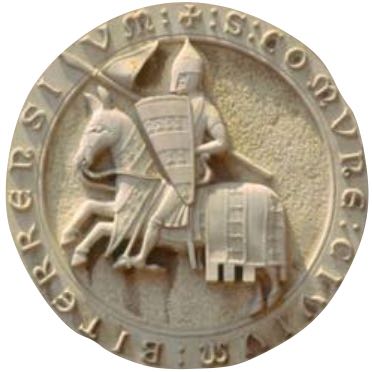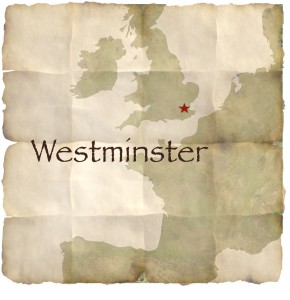‘Murder and rape are tools of trade for these animals. They use terror to extract payment, which they call taxes, and even payment does not guarantee safety.’
Edward of Woodstock-10th March 1355
He kept a stable of horses, both racehorses and tournament chargers, in a professionally managed stable, outside the palace. The stable also used land by the river at Staines for pasture and breeding. This arrangement allowed him complete control of the management and training of his horses but also concealed the costs from his father.
He had arrived in London the previous evening, before dark. Above the stable, he kept a suite of rooms where he shared a bed with the love of his life, Joan of Kent.
He arose early, leaving Joan to slumber, had taken a bath and put on some clean clothes before coming to meet his father. He knew the subject of the visit and had taken the opportunity to speak privately with Jean Froissart while he bathed and dressed.
As he entered the hall, he gazed around at the familiar scene. The Hall of Westminster was nearly three hundred years old. In winter, smoke bellowed eagerly from the fireplaces but today it spewed only from the food vendors’ stalls that lined the walls. Nevertheless, even today, on a pleasant morning, the hall appeared dark and gloomy. Spiralling smoke filled the roof, searching for escape through the vents provided for the purpose.
People, who wished to plead their case to the King or his councillors, packed the hall. Two sets of columns ran the whole three-hundred-foot length of the chamber. These columns gave the effect of an exceptionally large hall, separated into three exceptionally long cloisters. Due to the pitching of the pillars, one could not see from one cloister to the next. On days such as today, the main activities of the King’s Court occupied three of the corners of Westminster Hall.
The fourth corner was reserved for the King’s visitors. People who had appointments to see the King himself or one of his senior courtiers could wait there until a lackey escorted them to their appointments. The Prince knew of the stories about people meeting their wives, getting married and having children in the King’s corner while waiting for an appointment! Even now he chuckled at the thought.
Like all public places, commerce took place. Clerks, legal advisors, lobbyists, food vendors and even prostitutes plied their trade. The Prince found himself confronted by a particularly young and pretty girl.
She had obviously noticed him wending his way through the crowd, The girl moved to separate herself from the crush, leaning against a column, allowing herself to be noticed. Her low-cut bodice, made of the finest cloth, constrained her breasts. The prince glanced in her direction and immediately she pulled down her blouse to reveal a superb breast. She added a cheeky wink and an alluring smile. He shook his head and moved on. He heard her swear in annoyance.
He grinned to himself. Only a couple of months earlier, he might have been interested but currently, he revelled in his reunion with Joan of Kent.
He cut through to the royal lounge with minimum delay. He knew he was late! He recognised and greeted Sir Ralph Stafford, Seneschal of Aquitaine, who also waited outside the lounge. The Prince burst open the door without waiting to be announced or to receive any assistance from the flunkeys.
King Edward did not exactly welcome him. ‘Ah! You are here at last. Did you read the note I sent you?’
The Prince nodded to his father but then rushed to his mother, kneeling before her and kissing her hand.
‘Edward?’ His father’s voice was insistent.
The Prince rose and kissed his mother’s forehead.
‘Edward, did you read the note?’
The Prince finally turned and faced his father. ‘Of course. You want me to marry the daughter of some minor lord from the Pyrenees. That is why I am here.’
‘Did you really read my note; are you aware of whom this lady is.’ The King observed the Prince through slitted eyes.
The Prince walked slowly towards the King. He knew his father’s requirements for personal space were much greater than most people, so he stopped at a respectful distance. Because of the briefing he had been given by Jean Froissart, the Prince knew everything his father knew and a little more besides. Jean had passed on a few details he had not shared with the King. ‘Yes, I know, father, and it seems to me…’
King Edward cut him off. ‘I think I would like to hear some additional information before coming to any conclusions.’ He turned to the flunkey. ‘Bring in Sir Ralph.’
Sir Ralph Stafford, younger than King Edward, was clearly overweight. Nevertheless, it would not have been unreasonable to take them as twins. Sir Ralph wore the same full moustache and beard and had the same shape nose and ears.
The King greeted him as a brother, patting Sir Ralph’s stomach, his other hand on Sir Ralph’s shoulder. ‘The Seneschal of Aquitaine obviously ate well, Sir Ralph. Are you enjoying your retirement?.’
‘Eating well is an essential part of entertaining your friends, Sire.’ He smiled. ‘And your enemies! I am now enjoying my retirement but regret that so much in Aquitaine still needs attention. ‘
The King showed a philosophical mmood. ‘The last ten years have brought the worst and the best to all of us.’
‘The worst would be the Black Death?’
‘Without a doubt. We have all lost people we loved.’
‘And the best?’ Sir Ralph cocked his head.
‘The truce with the Franks, despite the Death or perhaps because of the Death, we have been given years of peace, time for my son and many others to grow to manhood, time for me to get to know my wife. Soon, I fear, it will end. On the last day of the tournament at Woodstock, I had a premonition that we are at the end of an age, the age of chivalry.’
‘I fear, Sire, that in Aquitaine, it has already ended.’
The King frowned. ‘There is little consideration for rules of combat or chivalry in Aquitaine?’
The Prince strolled back towards his mother and gazed into the roaring fire. He did not want his father to see the concern he felt. In his opinion, Aquitaine was a mess.
‘No, Sire. The French have tolerated, perhaps encouraged, roving armies, known as Routiers. They are led, and mainly comprised of, mercenaries, which both the Franks and ourselves have used.’
‘Routiers?’
‘Travellers, if you like. They have no apparent territorial ambitions, but they prey on unguarded houses or even towns in the border areas and increasingly outside of the borders. Our supporters suffer more than Frankish supporters. Murder and rape are tools of trade for these animals. They use terror to extract payment, which they call taxes, and even payment does not guarantee safety.’
‘Couldn’t you control them?’
‘We used and still use, many of our resources making regular forays into the wider area nominally under our control, to relieve towns and where possible attack the Routiers. We were successful in repelling them, as the last thing they want is a set-piece battle, in which English and Welsh archers could be employed. They are cowards; they simply vanish, retreating to the east, beyond Toulouse. It wastes so much time, manpower and money.’
‘They retreat to areas controlled by the Franks … and what happens there?’
‘The Franks have occupied old Occitan by building new towns, the bastides, and populating them with northern Franks. The Routiers leave the bastides alone but prey on the settlements inhabited by Occitaines. Steadily but surely, the Occitaines are leaving for Aragon or even Grenada, the Moorish kingdom in the south.’
‘They would prefer Moorish rule to dealing with these Routiers? Do the Franks do nothing to control them?’
‘No, Sire. then the Routiers reform at another place and another time and return to our lands. Consequently, towns are wasting resources turning themselves into de facto fortresses complete with moats, battlements and fortified drawbridges. Trade has collapsed. Farmers have left the fields; the economy is in ruins. Without fighting a single formal battle, the Franks continually extend their territory. And everywhere they go they build bastides.’
Unless we find a way of dealing with the routiers, Occitan will cease to exist, and soon after Aquitaine will follow it into oblivion.
Unless we find a way of dealing with the routiers, Occitan will cease to exist, and soon after Aquitaine will follow it into oblivion.

